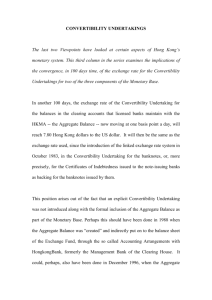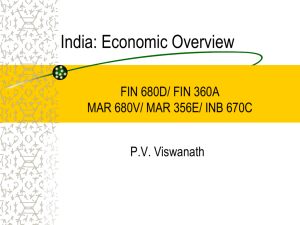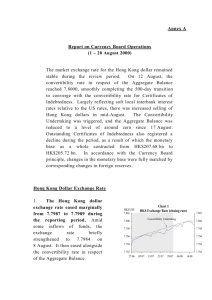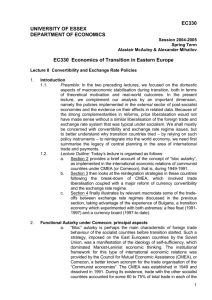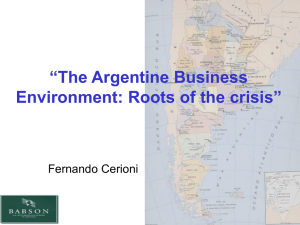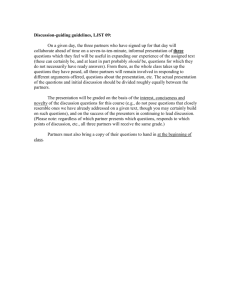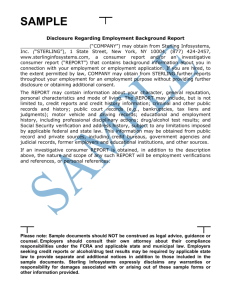(c) crown copyright Catalogue Reference:CAB/129/56 Image Reference:0027
advertisement
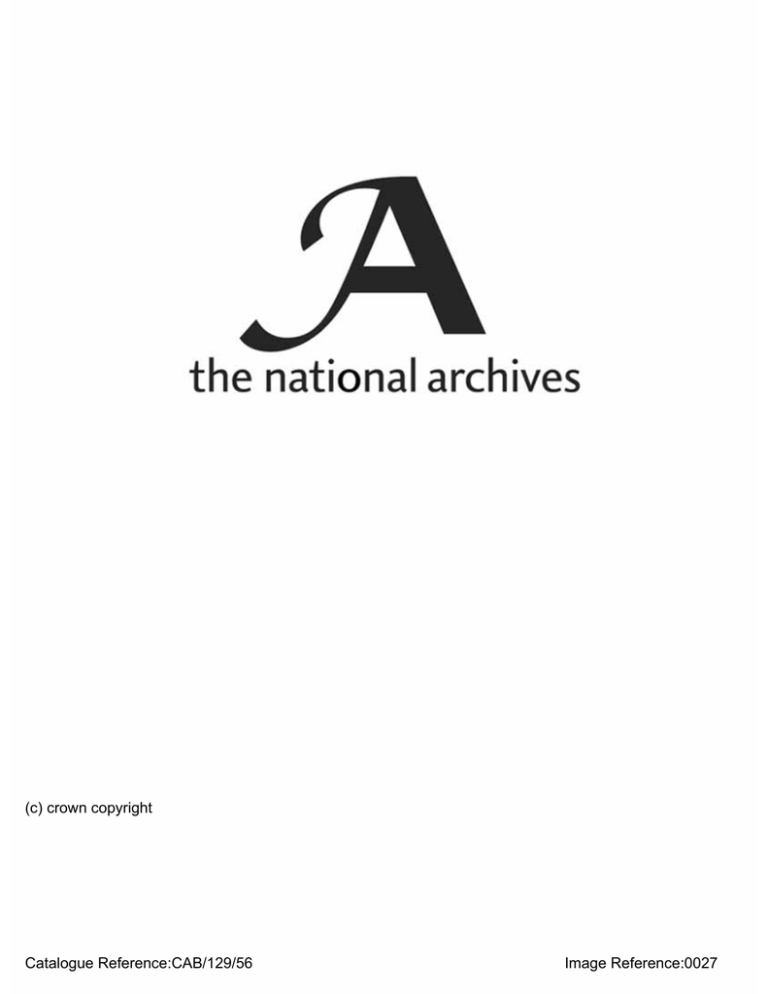
(c) crown copyright Catalogue Reference:CAB/129/56 Image Reference:0027 Printed for the Cabinet. October 1952 T h e circulation of this p a p e r h a s been strictly limited, i t is issued for the personal use of TOP SECRET ' Copy N o . C. ( 5 2 ) 3 7 7 31st October, 1952 CABINET THE " COLLECTIVE APPROACH MEMORANDUM TO CONVERTIBILITY" B Y T H E PAYMASTER-GENERAL I have set o u t in P . E . C . (52) 31 a n d 44 reasons w h y I think we should n o t proceed with the " collective a p p r o a c h t o convertibility." In this paper I summarise my views for the convenience of m y colleagues. 2. I n F e b r u a r y , a n d again in J u n e , we were threatened with dire consequences unless we at once m a d e t h e p o u n d convertible a n d let the rate of exchange float. This is the central theme of the proposals we are n o w asked to p u t before t h e Commonwealth Conference. 3. T h e main argument is the same. If we give u p supporting the p o u n d a n d let it float, w e shall, so w e are told, " mobilise t h e price mechanism in support of policy." This is perhaps a m o r e euphemistic variant of t h e usual phrase that it will " take t h e strain off t h e reserves a n d p u t it on t o the rate of exchange." B u t in plain English b o t h versions m e a n the same, namely curing a trade deficit by letting the value of the p o u n d fall a n d therefore t h e price of imports rise, until food becomes so dear a n d r a w materials so expensive that the people have t o eat less and factories have to lay off workers. Thus, through high prices and unemploy­ ment, the d e m a n d for imports is to be reduced, the policy often ascribed t o Conservatives by Socialists a n d as often repudiated b y u s . 4. - But even this unpleasant process is likely t o b e self-defeating since t h e fall in the p o u n d , save in very special circumstances, will reduce the foreign exchange earned by o u r exports. T h e trade g a p will then be increased, causing a further fall in t h e rate of exchange a n d thus a further widening of the g a p a n d so on. Speculation against t h e p o u n d , and a wage-price spiral, will a d d fuel t o the flames. 5. Convertibility of the p o u n d , moreover, will b e a serious blow t o o u r export trade. N o t only will it remove t h e effective incentive t o foreign holders of incon­ vertible sterling t o b u y sterling g o o d s ; it will offer foreigners an alluring prospect of earning dollars by cutting their imports of British g o o d s ; a n d in a dollar-hungry world t h e temptation will b e irresistible, whatever safeguards we m a y try t o erect. 6. T h e s e objections h a v e never been effectively answered. Nevertheless, it is proposed t o press this policy first o n the C o m m o n w e a l t h , then o n E u r o p e , then on t h e U n i t e d States. B u t t h e recent meeting of C o m m o n w e a l t h officials showed that t h e Dominions find serious difficulties in the plan. Most of them object strongly to t h e floating rate. M a n y object strongly t o convertibility; for this is t o be given, only t o foreigners, n o t to residents of the sterling a r e a ; indeed the latter, as they justly complain, will have t o p u t u p with m o r e severe restrictions so that foreigners can b e allowed t o change their p o u n d s into dollars. A s o n e of them r e m a r k e d , this gives members a positive incentive t o leave t h e sterling area. 43146 7. Recent discussions in the Organisation for E u r o p e a n Economic C o ­ operation have shown that the Europeans, likewise, are opposed to convertibility and the floating rate. They fear that the latter might " bring in its train political and social consequences which Governments could not contemplate " ; and they would object strongly to the break-up of the E u r o p e a n Payments U n i o n which the Treasury proposals would entail. 8. As for the Americans, the proposal is to ask them to recognise openly the right of all other countries to go on discriminating against them a n d the right of Commonwealth countries to intensify Imperial Preference. T h e floating rate would strike at the very heart of the philosophy implanted by the United States in the I . M . F . ; and a depreciating p o u n d would lay us open to charges of unfair competition against dollar goods. Having created this agreeable atmosphere we are then, apparently, to ask the Americans for $5 billion for an " exchange support fund " or a correspondingly increased subscription to the I.M.F. A t best it is hardly conceivable that such support would be forthcoming without conditions; and these are likely to be politically most embarrassing. 9. It m a y well be, in view of these objections, that the scheme will emerge in an almost unrecognisable form after negotiations with the Commonwealth, with E u r o p e and with the United States. But the final form is almost certain to be more dangerous a n d disadvantageous to us, not less. F o r in the effort to get the floating rate and convertibility accepted, concession after concession will be m a d e and the essential safeguards will tend to be whittled away. Already the Chancellor proposes to relax restrictions on dollar purchases. W h a t shall we be faced with in six of nine m o n t h s ' time when, according to the latest forecasts, our balance of payments will be taking a serious turn for the worse? Either we shall have to back out ignominiously or we shall have to accept conditions dangerous to Britain and quite possibly unacceptable to Parliament. 10. I therefore believe that we should decide definitely not to press the Commonwealth to adopt convertibility and a floating rate until our economic position is much stronger. While urging continued restraint in the internal policies of all sterling area countries, we should push ahead with plans for sound economic development of the Commonwealth, for freer trade and greater production in Europe, for reducing instability in trade in primary commodities and for increasing international reserves through freer use of the International M o n e t a r y F u n d or in other ways. We should work in close co-operation with the United States a n d press on them the need for " good creditor " policies. 11. N o one can really claim that an effective p r o g r a m m e on these lines would mean " standing still." On the contrary, it would represent a most successful out­ come of the forthcoming Conference. F o r reasons I have given in P.E.C. (52) 44 I believe it would be welcome to most m e m b e r s of the C o m m o n w e a l t h and accept­ able to all. Recent reports from E u r o p e suggest that it is also very m u c h in line with the views of O.E.E.C. countries. 12. As for the Americans, I feel sure they could be convinced that this is the right policy. It is true that they aim, as we do, at one multilateral world with convertibility and non-descrimination as the ultimate objective. But it cannot really be United States policy to enforce this whatever the cost. 13. I should have thought that the present over-riding objective of all the free world—not least America—was t o win the cold war a n d . to disprove the Russian belief that the Western world can be forced into bankruptcy a n d political disunity. If so, the major theme of any approach to the Americans should not be how we can achieve " convertibility," b u t h o w we can all maintain our E u r o p e a n defences and yet get through the next couple of years without an economic crash, the spread of C o m m u n i s m on the Continent and the growth of anti-American feeling in Britain. 14. F o r reasons 1 have described in P.E.C. (52) 31 I fear that the " collective approach to convertibility " might end in a serious set-back in the cold war. It might well lead to the worst financial crisis in our history. T h e need to maintain convertibility would almost certainly require much more severe internal measures than we endure t o - d a y ; it would almost certainly m e a n considerably m o r e unem­ ployment and a further severe cut in the defence programme. It would play into the hands of those with anti-American views, who would argue that we were trying to borrow m o r e billions of dollars from the United States, not to buy food as in 1946, b u t to finance a " bankers' r a m p " ; and in return, they would say, we were prepared to give Wall Street the right to dictate our internal policy. 15. F o r the first time since the war, production in Western E u r o p e and the United K i n g d o m has ceased to rise and has, indeed, started to fall. Yet without more production either our defences, our social services or our standard of life must fall. A r e we now to substitute for the goal of higher production the goal of convertibility? For, in present circumstances, the two are inconsistent, since convertibility without special restrictions, which it is intended to remove, can only be maintained if E u r o p e a n Governments are prepared to depress production a n d incomes, a n d so the demand for imports, to the extent necessary to balance their dollar trade. 16. I feel sure that, if we explain all this frankly to the Americans, they will not press us to adopt convertibility coute que coute. Convertibility and non­ discrimination are very important objectives; b u t they are means to an end, not an end in themselves. T h e almost theological fervour with which they were advocated at the end of the war by some people in the U n i t e d States has now, i t seems, largely evaporated. The Marshall Plan r a n completely counter to those ideas, and showed that the Americans now regard the cold war as of far m o r e importance. 17. W e should certainly tell them that we have n o intention of trying to build u p a non-dollar w o r l d ; we adhere more firmly t h a n ever to the objective of one world and intend t o achieve it as soon as is h u m a n l y possible. But we are very much afraid that a n attempt to plunge into it before we are strong enough might end in failure with disastrous economic and political consequences; it would m e a n a reversion to Schachtian policies and the e n d of all h o p e of ever achieving multilateralism. 18. I therefore hope that we shall p u t before the C o m m o n w e a l t h P r i m e Ministers a constructive p r o g r a m m e for economic expansion such as I have outlined in p a r a g r a p h 10, and that we shall drop, for the time being, the idea of convertibility a n d a floating rate which would almost certainly result in economic contraction and unemployment. W e are n o t yet strong enough for these financial experiments, nor, I believe, are the people ready to accept the entirely new political philosophy they involve. I n view of the criticisms expressed at the C o m m o n w e a l t h officials' meeting we can certainly pursue this course without losing face, provided we take a definite decision n o w ; but it may well b e our last chance. Once negotia­ fions begin in earnest and Ministers become involved in defending the plan, it will become more and more difficult to take a clear view a n d we may find ourselves committed to a course that is full of dangers and from which it will be exceedingly difficult to extricate ourselves. C. Paymaster-General's 31st October, Office, 1952. S.W.1,
